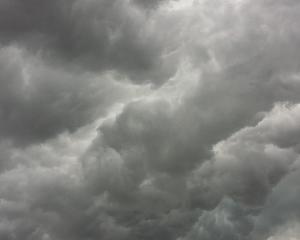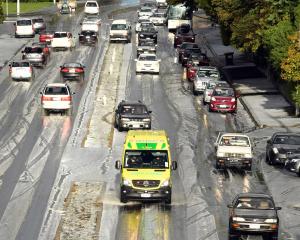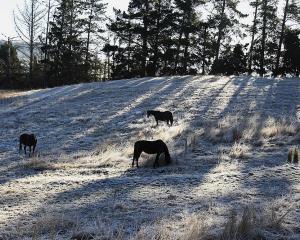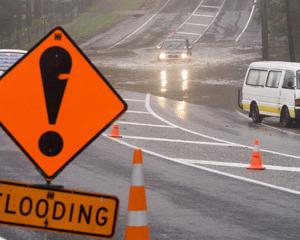The downpour, which started about 11pm on Saturday in most places and eased about 8am, pushed Alexandra to possibly its wettest May yet, the MetService said.
It caused slips, blocked drains, surface flooding and rivers to rise in already sodden eastern parts of the region.
The rain had stopped and surface water largely receded by mid-morning yesterday, with most rivers dropping by late afternoon, although the Otago Regional Council continued to monitor the Taieri River west of Dunedin, the Manuherikia in Central Otago and the Pomahaka in South Otago, which were still rising last night.
Each was expected to peak overnight.
In Dunedin, the Fire Service was called to pump out several basements in Macandrew Bay and South Dunedin when culverts and drains overflowed.
Autumn debris blocking drains and culverts made matters worse.
Senior Sergeant Steve Aitken said police dealt with much surface flooding and many overflowing drains overnight.
Multiple small slips closed Portobello Rd between Dunedin and Macandrew Bay, as well as Highcliff Rd, for a time.
Across the harbour at Careys Bay, a large tree blocked Williams St for some time. At St Leonards last night, Burkes Dr remained closed by a small slip, while nearby a larger bank came down against the home of Lloyd Hiscock, stopping at his back door.
"I heard these thuds. After about the third thud, I got up to look and then there was this almighty bang."
The hill behind the house had collapsed, bringing down tonnes of dirt against the back of the Hiscocks' house.
"I didn't sleep well after that."
Not only had it given the family a fright, it had them worried more would come down, Mr Hiscock said.
In 35 years, they had only had one small slip, and that was years ago.
He would contact the Dunedin City Council because he was concerned the slip might have been caused by inadequate drainage on properties that were subdivided above his home.
"I'm nervous more's going to come down."
In Green Island, residents said water running off surrounding hills ran down driveways "like rivers" and flooded basements and garages.
A slip closed Scroggs Hill Rd for a short time, and a group of District Rd neighbours, who said they lived in a landslip zone, said they would be demanding action from the city council after a dramatic river of water ran down off a recently deforested hill behind their homes.
"We are seriously concerned this thing [the hill] is going to go, and soon," one resident said.
Much of the water that fell on the city overnight had receded by mid-morning yesterday, and all roads were open again by late afternoon.
In the Clutha district, heavy rain caused surface flooding that closed several rural roads around Milton and Balclutha, Constable Steve Griffiths said.
A slip on the Nugget Point Rd meant some tourists in campervans, who had stayed overnight at Nugget Point, could not get out until the road was cleared in the afternoon.
A minor slip on State Highway 6 between Queenstown and Kingston caused only minimal delays, a New Zealand Transport Agency spokesman said.
Ten Otago rivers rose to their first flood warning level, prompting farmers in some areas to move stock, but most rivers peaked and started dropping by about 2pm.
Alexandra bore the worst of the rainstorm.
It received 67.3mm in the 24-hour period from midday Saturday, with 52.8mm falling between 8pm and 4am.
MetService forecaster Allister Gorman said Alexandra's average rainfall in May was just 23mm, and the wettest May on MetService records was 46.5mm.
Sightseers gathered to watch the Manuherikia River spill into catchment paddocks at Omakau and Galloway, but no property was threatened and farmers had already shifted stock to higher ground.
Surface flooding affected some Central Otago roads and a slip blocked Dansey Pass for part of Sunday.
In North Otago, some minor roads were closed by surface flooding and some tributaries spilled across paddocks and roads, the worst hit areas being in the Waiareka and Kakanui Valleys.
Mr Gorman said many parts of Otago received more than their usual total rainfall for May during the downpour.
Because it had already been wet in much of the east of the South Island, the rain did a bit more damage than a similar amount normally would.
The heavy rain brought memories of extensive flooding a year ago, which started on May 23 and lasted more than seven days, flooding the Taieri and isolating some North Otago communities.
Rainfall noon Saturday to noon Sunday
• Dunedin City: 51.4mm (35.6mm between 7pm and 1am, heaviest 11pm-midnight)
• Musselburgh: 55.8mm (38.8mm between 7pm and 1am, heaviest 11pm-midnight)
• Alexandra: 67.3mm (52.8mm between 8pm and 4am, heaviest 11pm-midnight)
• Ranfurly: 52.8mm (39.2mm between 7pm and 4am, heaviest 11pm-midnight)
• Nugget Point: 66.8mm (42.4mm between midnight and 7am, heaviest 5am-6am)
• Oamaru: 55.6mm (37mm between 5pm and 11pm, heaviest 9pm-10pm)
• Wanaka: 35.2mm (18.4mm between 10pm and 4am, heaviest midnight-1am)
• Queenstown: 20mm over whole 24-hour period.
SOURCE: MetService







